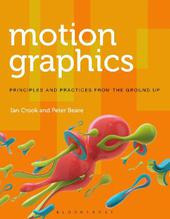
|
Motion Graphics: Principles and Practices from the Ground Up
Paperback / softback
Main Details
| Title |
Motion Graphics: Principles and Practices from the Ground Up
|
| Authors and Contributors |
By (author) Ian Crook
|
|
By (author) Peter Beare
|
| Series | Required Reading Range |
|---|
| Physical Properties |
| Format:Paperback / softback | | Pages:200 | | Dimensions(mm): Height 270,Width 210 |
|
| Category/Genre | Cinematography and television camerawork
Animated films
Digital animation |
|---|
| ISBN/Barcode |
9781472569004
|
| Classifications | Dewey:777.902856696 |
|---|
| Audience | | Tertiary Education (US: College) | |
|---|
| Illustrations |
200 colour illus
|
|
Publishing Details |
| Publisher |
Bloomsbury Publishing PLC
|
| Imprint |
Fairchild Books
|
| Publication Date |
17 December 2015 |
| Publication Country |
United Kingdom
|
Description
Song lyrics fly across the screen in time to music. A globe spins and zooms into a war-torn country. Money rises from a screen to explain an economic situation. Now, more than ever, we are surrounded by these motion graphics on our TV and cinema screens, on our smartphones, computers, and tablets, on Main Street and in our galleries. Motion Graphics: Principles and Processes from the Ground Up is your introduction to the core principles of the discipline, whether your background or ambitions lie in animation, graphic design, film production, or visual effects. Ian Crook and Peter Beare provide you with a wide understanding of the key concepts and techniques that will help you plan, develop and produce your own creative projects.
Author Biography
Ian Crook is a senior lecturer on the Media Technology BSc (Hons) programmes at the University of Central Lancashire, UK. Peter Beare is course leader for BSc (Hons) Media Production & Technology at the University of Central Lancashire, UK. He is the co-author of User Experience Design (Bloomsbury 2014).
ReviewsMotion Graphics provides an informative breakdown of the key concepts in this field, while also delivering technical advice and vivid color visuals to assist students in understanding this medium and the many ways it can be used to visually communicate rich and complex ideas. -- Julia DeArriba-Montgomery, Florida State College of Jacksonville, US Motion Graphics delivers an accessible range of reference materials and projects. I would particularly recommend this text to foundational level HE students who might be unfamiliar with moving image based workflows. The book is clear and concise in its definitions of the most relevant terminology. A particular highlight must be with quality of examples referenced from various professional practice based creative agencies, along with short but insightful interviews covering each agencies individual approach to the design process. * Stephen Hibbert, University of Huddersfield, UK *
|